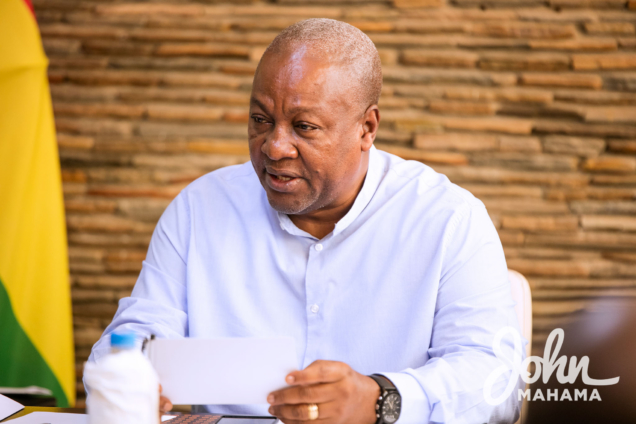
Audio By Carbonatix
Former President Mahama has explained why he said he had dead goat syndrome.
According to him, he used the idiomatic expression due to the frustration associated with the deregulation of petroleum prices.
This, he stated, is because he knew that if the fuel prices went up, the leadership of the Trades Union Congress (TUC) and other unions will not leave him in peace.
Mr. Mahama said he could not bear the mass labour unrest that was prevailing at the time.
“I am the only government in the Fourth Republic where all organised labour came together and went on strike and shut down the country.
“I was one of the most harassed Presidents by Organised Labour. That is what led to the dead goat syndrome… because when you kill a goat, you cannot frighten it with the knife again, really!... I don't know why I said that, but of course our opponents took it out of context. They said I have said that I won't listen to anybody,” he explained during a lecture at Academic City University College on Friday.
It would be recalled that the ex-president in 2015 said he had become impervious to threats of strikes and demonstrations in Ghana and will not yield to any of such threats in the then upcoming election year.
Adopting what he calls a "dead-goat syndrome", the President said he would not be hoodwinked by such strategies by workers.
"I have seen more demonstrations and strikes in my first two years. I don't think it can get worse. It is said that when you kill a goat and you frighten it with a knife, it doesn't fear the knife because it is dead already.
"I have a dead goat syndrome," he told a Ghanaian population in Botswana where he was on a three-day official state visit.
The country, during Mr. Mahama's tenure, experienced a number of strikes and demonstrations from workers, most of whom protested against poor conditions of service.
The Trades Union Congress was one of the many workers' unions that were on the streets to protest the worsening economic crisis.
The President said such demonstrations are part of strategies by workers' groups to tie the hands of government, especially in election years.
He noted that when governments yield to such threats, the economy and budget are thrown out of gear.
Latest Stories
-
GRA invites traders to an emergency meeting to address concerns in new VAT Act
3 minutes -
Samantha Cohen CVO OBE leads landmark Ghana visit
10 minutes -
Ghana to host Forty under 40 Africa awards
16 minutes -
Baba Jamal case offers opportunity to monitor money in politics – Sulemana Braimah
25 minutes -
Remand of East Legon developer sparks debate over ‘criminalising’ civil disputes
28 minutes -
EBID partners Women of Valour as headline sponsor for London 2026 event
42 minutes -
What’s the point in issuing statements?– Franklin Cudjoe criticises NDC over Baba Jamal u-turn
47 minutes -
Today’s Front pages: Wednesday, February 11, 2026
55 minutes -
Wacam demands investigation into officials after JoyNews galamsey extortion exposé
1 hour -
New VAT won’t spike prices – GRA hits back at Abossey Okai traders
1 hour -
GRA cracks down on VAT defaulters with new enforcement team
1 hour -
GREY launches first community education project focused on dignity and access
1 hour -
What gold and copper tell us about the new logic of mining investment in Africa
2 hours -
BoG revises directive on Net Open Position limits
2 hours -
They think we’ve stolen their cocoa – LBCs blame payment delays for farmer anger
3 hours

